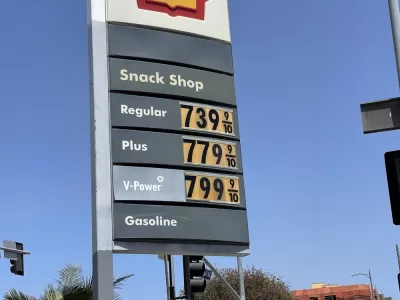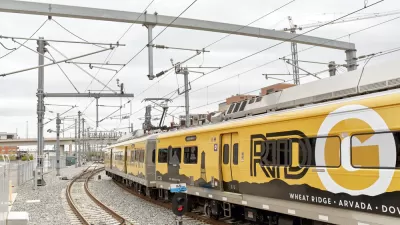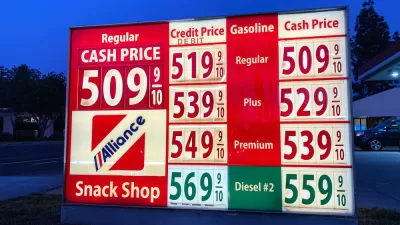Surveys and transit ridership both show some signs, with significant caveats, of the limits of the appetite for gasoline in Colorado.

While high gas prices have historically shown just how stubborn drivers can be, there is usually some reduction of driving when gas prices spike. With many people emerging back into their normal day-to-day routines and making up for lost time with road trips and vacations after two long years of pandemic restrictions, the current high gas prices are less likely to produce outcomes in line with precedent.
With the uncertainty of mobility in 2022 in mind, Matt Bloom recently dug into the mood and trends of drivers in Colorado, where the average gas price recently hit $4.62 per gallon—the highest ever recorded in the state and a 40 percent increase over last year.
“As a result, roughly 67 percent of drivers have started to drive less, according to a AAA survey of Colorado residents,” reports Bloom. “Pain at the pump has forced some people to readjust their vacation plans, rethink their work commutes and cut back on the amount they’re saving each month.”
For another key metric, albeit one that does not necessarily reflect a direct connection to gas prices, transit ridership is on the rise in the Denver area, although still well below pre-pandemic levels. “Public transit ridership in the Denver area has seen a slight increase in ridership over recent months, but it remains below pre-pandemic levels. Metro area residents took 4.8 million trips via bus or train in March — a 42 percent jump over the same time in 2021, according to RTD’s latest ridership figures,” reports Bloom.
Still, “the Colorado Department of Transportation and Denver International Airport both reported near pre-pandemic passenger numbers on roads and airplanes over the recent Memorial Day holiday,” according to Bloom, so drivers aren’t exactly abandoning their vehicles.
FULL STORY: Record gas prices force Coloradans to reevaluate commutes and summer travel plans

Planetizen Federal Action Tracker
A weekly monitor of how Trump’s orders and actions are impacting planners and planning in America.

Maui's Vacation Rental Debate Turns Ugly
Verbal attacks, misinformation campaigns and fistfights plague a high-stakes debate to convert thousands of vacation rentals into long-term housing.

Restaurant Patios Were a Pandemic Win — Why Were They so Hard to Keep?
Social distancing requirements and changes in travel patterns prompted cities to pilot new uses for street and sidewalk space. Then it got complicated.

In California Battle of Housing vs. Environment, Housing Just Won
A new state law significantly limits the power of CEQA, an environmental review law that served as a powerful tool for blocking new development.

Boulder Eliminates Parking Minimums Citywide
Officials estimate the cost of building a single underground parking space at up to $100,000.

Orange County, Florida Adopts Largest US “Sprawl Repair” Code
The ‘Orange Code’ seeks to rectify decades of sprawl-inducing, car-oriented development.
Urban Design for Planners 1: Software Tools
This six-course series explores essential urban design concepts using open source software and equips planners with the tools they need to participate fully in the urban design process.
Planning for Universal Design
Learn the tools for implementing Universal Design in planning regulations.
Heyer Gruel & Associates PA
JM Goldson LLC
Custer County Colorado
City of Camden Redevelopment Agency
City of Astoria
Transportation Research & Education Center (TREC) at Portland State University
Jefferson Parish Government
Camden Redevelopment Agency
City of Claremont





























